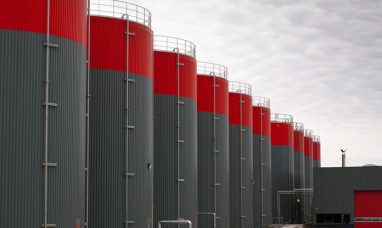DUBLIN, Aug. 11, 2023 /PRNewswire/ — The “Hydrodesulfurization Catalyst Market – Global Industry Size, Share, Trends, Opportunity, and Forecast, 2018-2028F Segmented By Feedstock, By Type, By End-User Industry, By Region, and Competition” report has been added to ResearchAndMarkets.com’s offering.

The global Hydrodesulfurization Catalysts market is on track to experience significant growth throughout the forecast period of 2028, primarily attributed to the tightening grip of environmental regulations.
The shift towards cleaner alternatives to fossil fuels, such as biofuels like ethanol and biodiesel, is also gaining momentum across industries. Within this landscape, Hydrodesulfurization (HDS) Catalysts play a pivotal role, particularly within the oil and gas sector.
These catalysts are instrumental in the removal of sulfur from crude oil, a crucial step in the refining process. As the global demand for cleaner fuels escalates and stringent environmental regulations take center stage, the hydrodesulfurization (HDS) catalyst market is witnessing remarkable expansion.
The pressure to curtail sulfur content in fuels, especially diesel, to comply with global sulfur emission standards is propelling the refining industry into action. A prime example is the International Maritime Organization (IMO), which implemented a mandate to cap sulfur content in marine fuels at 0.5% starting January 2020, a significant reduction from the previous 3.5% limit.
This monumental shift has triggered a surge in demand for HDS Catalysts, as refineries scramble to upgrade their facilities to meet the new regulations. Consequently, this surge is instrumental in driving the growth of the global hydrodesulfurization catalysts market.
In the pursuit of strengthening their market foothold, industry players are dedicating efforts towards product innovation, collaborations, and strategic acquisitions. The Hydrodesulfurization Catalysts market is poised to flourish in the coming years, propelled by the ongoing demand for cleaner fuels and the unyielding force of stringent environmental regulations.
The market is highly competitive, with several global and regional players vying for market share through product innovation, collaborations, and acquisitions. As the world moves towards a cleaner and sustainable future, the HDS Catalysts market will play a crucial role in the oil and gas industry.
The refining industry is a crucial component of the global energy sector, responsible for processing crude oil into various refined products such as gasoline, diesel, jet fuel, and others. However, crude oil typically contains impurities, such as sulfur, which can have adverse effects on the environment and human health.
The market is also expected to witness innovations in catalyst design and increased investment in research and development to improve the efficiency and effectiveness of the process. The refining industry will continue to play a critical role in the global energy sector, and the use of Hydrodesulfurization catalysts or HDS Catalysts will be essential in meeting the growing demand for cleaner and more sustainable energy sources.
Growing Demand for Naphtha is Driving the Growth of the Hydrodesulfurization Catalyst Market
Naphtha is a hydrocarbon liquid mixture that is typically produced during the refining process of crude oil. It is used as a feedstock for various chemical processes, including the production of gasoline, plastics, and other petrochemical products.
However, Naphtha can contain impurities, such as sulfur and nitrogen compounds, that can have adverse effects on the environment and the performance of downstream processes. As a result, the refining industry often employs Hydrodesulfurization (HDS) catalysts to remove these impurities from Naphtha.
HDS catalysts are typically composed of metals such as molybdenum or nickel, which are supported on a high-surface-area material such as alumina or silica. The catalyst is used in a reactor, where the Naphtha is reacted with hydrogen gas in the presence of the catalyst. The sulfur and nitrogen compounds in the Naphtha react with the hydrogen to form hydrogen sulfide and ammonia, respectively, which can be removed from the product stream.
The use of HDS catalysts in the treatment of Naphtha can improve the performance and efficiency of downstream processes. For instance, the presence of sulfur and nitrogen compounds in Naphtha can lead to the fouling of catalysts used in downstream processes, such as the production of plastics.
By removing these impurities, the HDS catalysts can improve the lifespan and performance of these catalysts, reducing the need for costly replacements. The use of HDS catalysts in the treatment of Naphtha can also improve the environmental impact of the refining industry. The sulfur and nitrogen compounds in Naphtha can contribute to air pollution, including the formation of smog and acid rain. By removing these impurities, the HDS catalysts can reduce the emissions of harmful pollutants and improve the air quality in surrounding areas.
Therefore, the use of HDS catalysts is an essential technology for the refining industry, particularly in the treatment of Naphtha. The catalysts can improve the performance and efficiency of downstream processes while also reducing the environmental impact of the industry. As the demand for cleaner fuels and sustainable chemical processes continues to grow, the use of Hydrodesulfurization catalysts, or HDS catalysts, is expected to become even more important in the refining industry.
Rising Demand for Diesel Fuel is Driving the Growth of the Hydrodesulfurization Catalyst Market
Diesel fuel is a critical component of the global energy sector and is used to power various transportation and industrial applications. However, diesel fuel typically contains impurities, such as sulfur compounds, that can have adverse effects on the environment and human health.
As a result, the refining industry employs various technologies, including Hydrodesulfurization (HDS), to remove these impurities and produce cleaner diesel fuel. HDS is a catalytic process that involves the use of HDS catalysts to remove sulfur compounds from diesel fuel.
The process involves reacting the diesel fuel with hydrogen gas in the presence of the catalyst, which promotes the conversion of sulfur compounds into hydrogen sulfide, a less harmful substance. The hydrogen sulfide can then be removed from the product stream using various downstream processing techniques.
The use of Hydrodesulfurization catalysts or HDS catalysts in the treatment of diesel fuel has become increasingly important due to stricter environmental regulations and the growing demand for cleaner fuels. These regulations have forced refineries to invest in Hydrodesulfurization catalysts, or HDS catalysts, and other technologies to comply with the new standards.
Competitive landscape
Company Profiles: Detailed analysis of the major companies present in the global Hydrodesulfurization Catalysts market.
- Advanced Refining Technologies LLC
- Albemarle Corporation
- Haldor Topsoe Inc
- Clariant AG
- BASF SE
- Shell PLC
- China Petroleum and Chemical Corporation (Sinopec)
- Johnson Matthey PLC
- Dorf Ketal Specialty Catalysts LLC
- Axens SA
Report Scope:
Hydrodesulfurization Catalysts Market, By Feedstock:
- Natural Gas
- Naphtha
- Heavy Oil
- Diesel Oil
- Kerosene
- Others
Hydrodesulfurization Catalysts Market, By Type:
- Cobalt-Molybdenum
- Nickel Based
- Others
Hydrodesulfurization Catalysts Market, By End-User Industry:
- Petro Chemicals
- Natural Gas Processing
Hydrodesulfurization Catalysts Market, By Region:
- North America
- United States
- Mexico
- Canada
- Europe
- France
- Germany
- United Kingdom
- Spain
- Italy
- Asia-Pacific
- China
- India
- South Korea
- Japan
- Australia
- South America
- Brazil
- Argentina
- Colombia
- Middle East & Africa
- South Africa
- Saudi Arabia
- UAE
For more information about this report visit https://www.researchandmarkets.com/r/z0ac2u
About ResearchAndMarkets.com
ResearchAndMarkets.com is the world’s leading source for international market research reports and market data. We provide you with the latest data on international and regional markets, key industries, the top companies, new products and the latest trends.
Media Contact:
Research and Markets
Laura Wood, Senior Manager
press@researchandmarkets.com
For E.S.T Office Hours Call +1-917-300-0470
For U.S./CAN Toll Free Call +1-800-526-8630
For GMT Office Hours Call +353-1-416-8900
U.S. Fax: 646-607-1907
Fax (outside U.S.): +353-1-481-1716
Logo: https://mma.prnewswire.com/media/539438/Research_and_Markets_Logo.jpg
SOURCE Research and Markets

Featured image: Megapixl © jimsphotos








